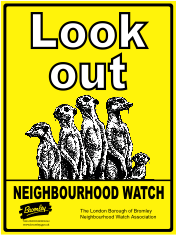Being Involved
If you wish to become involved please download and complete a BNWA Application Form and email it to us at the address shown.
If your home is within an existing Neighbourhood Watch area we will forward your details to the Coordinator for that scheme.
You may like to download Setting Up A Watch our introduction to setting up a scheme to see what is involved. For further reading you may also like to download the BNWA-Coordinators Guide which gives a little more information on the role of a Street Coordinator, the lynch pin of the Neighbourhood Watch scheme.
Our national body, Neighbourhood Watch Network has also produced a “Welcome Pack” with lots of ideas for you to consider. View it here.
Schemes
Neighbourhood Watch schemes are run by their members through a Coordinator and are supported by the Police and in many Areas a local Neighbourhood Watch Association. Schemes can vary in size. A volunteer resident Coordinator runs the scheme and liaises with the Police, they receive information and messages to keep them in touch with activities. It must be recognised that the scheme is a community initiative, which is supported by the police, not run by them, so success depends on what the members make of it.
The Police can’t deal with the problems and issues arising from crime and anti-social behaviour alone; they need the help of the whole community. Neighbourhood Watch provides a way for local people to play an important part in addressing this balance and making their communities safer.
If you’re not in touch with your local Neighbourhood Watch group and don’t know how to reach it, please use the “Contact us” form. If there is a group in your area, we will help you to contact the scheme Coordinator to find out about joining their scheme.
A Coordinator’s role
The role of a Neighbourhood Watch Coordinator is to set up and maintain a Neighbourhood Watch scheme within a specific street, neighbourhood or area. They will need to be in contact with the local Safer Neighbourhoods Team who will help clarify what is involved and the initial steps to take. Whilst each Team may develop specific procedures, the following are suggested as the main duties which co-ordinators will need to manage:
- Encourage vigilance amongst scheme members and actively encourage the early reporting of suspicious incidents to the police.
- Receive crime information from the Neighbourhood Watch messaging system and distribute these messages to scheme members.
- Encourage scheme members to be aware of and put into practice crime prevention measures, such as property marking and security devices.
- Provide advice to members about dealing with callers at the door.
- Circulate newsletters and other relevant information to scheme members.
- Welcome newcomers to the neighbourhood and invite them to be part of the scheme.
- Supply each scheme member with Neighbourhood Watch and crime prevention literature, such as Neighbourhood Watch window stickers and incident report cards.
These are the main tasks which would be expected of a coordinator, tasks will vary according to the needs of each individual neighbourhood.
Ward & Area Coordinators
Some larger communities also appoint Area and/or Ward Coordinators and we encourage individual Safer Neighbourhoods Panels to have at least one Neighbourhood Watch representative. These are typically more active roles to assist the other Coordinators, organising Coordinator meetings and neighbourhood meetings as well as being an extra link to the local Police.
Like all other Coordinators, these roles are completely voluntary and, therefore, unpaid.
Neighbourhood Watch Street Signs and Window Stickers
Street Signs and Window Stickers, are available (whilst stocks last) to registered Coordinators only via the “Contact us” form.
Street Signs should be put up by Coordinators onto lampposts, out of reach of pedestrians, at either end of the Watch with, possibly, one or two within the Watch, if it covers a large number of homes.

